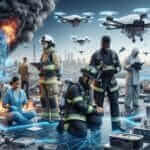The Reading section of the IELTS exam can be challenging, requiring test-takers to effectively comprehend and analyze academic texts. A popular trend in recent Reading modules has been contemporary and relevant topics, such as the economic impacts of pandemics on various sectors. Given the global significance of COVID-19, it’s likely that this topic will continue to appear in future tests. In this article, we’ll explore this through a structured Reading practice, helping you hone your skills for the IELTS Reading test.
Full Reading Practice
Passage
Economic Impacts of Pandemics on Tourism
Pandemics, such as COVID-19, have had far-reaching impacts on global tourism, profoundly disrupting economies that largely depend on this sector. The effects of pandemics on tourism can be broadly categorized into immediate and long-term impacts.
Immediate Impacts:
The immediate impacts of pandemics on tourism are stark. Travel restrictions, lockdowns, and border closures lead to a drastic decline in tourist arrivals. For instance, during the height of the COVID-19 pandemic, global tourism experienced an unprecedented decline by over 70%. Countries renowned for their tourism industry, such as Italy, Spain, and Thailand, saw significant reductions in revenue. Hotels, airlines, and travel agencies bore the brunt of these restrictions, leading to massive layoffs and furloughs.
Long-Term Impacts:
The long-term effects are multifaceted. Economies reliant on tourism must diversify to mitigate future risks, implying significant restructuring. Additionally, there may be shifts in tourist behavior and preferences. Post-pandemic, there has been a notable trend towards local and regional travel rather than international tourism, attributed to lingering health concerns and economic uncertainty.
Global tourism infrastructure is expected to undergo changes focusing on health and safety protocols. This will likely increase operational costs, which could be passed on to consumers, thus reducing the appeal of travel for budget-conscious tourists.
Positive Reflections:
Interestingly, the reduction in tourism has had some positive environmental impacts. Popular tourist destinations have reported lower pollution levels and rejuvenation of natural habitats. While these benefits are often seen as temporary, they highlight the potential for sustainable tourism practices in the future.
Conclusion:
In summary, pandemics impact tourism both immediately and long-term, causing economic shifts, transformations in travel behaviors, and potential environmental benefits. Future recovery in the tourism sector will likely depend on the ability of destinations to adapt to new realities and prioritize sustainable tourism practices.
 Economic impacts of pandemics on tourism
Economic impacts of pandemics on tourism
Questions
Multiple Choice
-
Which sector is most immediately affected by pandemics according to the passage?
- A) Education
- B) Healthcare
- C) Tourism
- D) Manufacturing
-
What has been a notable trend in tourist preferences post-pandemic?
- A) Increase in international travel
- B) Shift towards virtual tourism
- C) Preference for local and regional travel
- D) Increase in luxury tourism
True/False/Not Given
-
The passage states that COVID-19 led to a 50% decline in global tourism.
- A) True
- B) False
- C) Not Given
-
All environmental impacts of reduced tourism are permanent.
- A) True
- B) False
- C) Not Given
Matching Headings
- Match each paragraph with the appropriate heading.
| Paragraph | Heading |
|---|---|
| 1 | Positive Reflections |
| 2 | Immediate Impacts |
| 3 | Conclusion |
| 4 | Long-Term Impacts |
Answer Key
- C – Tourism
- C – Preference for local and regional travel
- B – False
- B – False
- 1 – Positive Reflections, 2 – Immediate Impacts, 3 – Conclusion, 4 – Long-Term Impacts
Common Mistakes
Many candidates misunderstand the differentiation between True/False/Not Given questions and Yes/No/Not Given questions. Pay close attention to these details as they are crucial in this section. Moreover, make sure to manage your time effectively; often the failure comes not from lack of knowledge but from running out of time.
Vocabulary
- Profoundly (adv): /prəˈfaʊnd.li/ – deeply or intensely
- Diversify (v): /daɪˈvɜː.sɪ.faɪ/ – to vary or expand the range of products
- Mitigate (v): /ˈmɪt.ɪ.ɡeɪt/ – to make less severe, serious, or painful
- Rejuvenation (n): /rɪˌdʒuː.vəˈneɪ.ʃən/ – the action of making something look or feel better, fresher, or more lively
Grammar Points
- Passive Voice: Often used to focus on the action rather than the subject.
- Example: “The impacts of pandemics on tourism are stark.”
- Conditional Sentences: Used to discuss potential outcomes and their causes.
- Example: “If economies reliant on tourism do not diversify, they may face severe long-term impacts.”
Tips for High IELTS Reading Scores
- Skimming and Scanning: These techniques are crucial for quickly locating information and understanding the general idea of the text.
- Practice Regularly: Regular practice under timed conditions will help you manage your time better during the actual test.
- Expand Your Vocabulary: A strong vocabulary allows you to understand texts more efficiently and accurately.
- Understanding Question Types: Familiarize yourself with the different types of questions that can appear in the Reading section.
Remember, consistent practice and thorough understanding of test strategies are the keys to achieving a high score in the IELTS Reading section.


